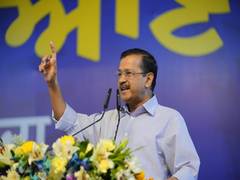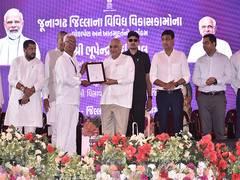SC directs consortium of NLUs to provide scribes to physically disabled candidates
New Delhi, Mar 17 (PTI) The Supreme Court on Friday directed the Consortium of National Law Universities to ensure that physically disabled candidates, who are unable to find scribes on their own, are provided with one to take up the CLAT examination for admissions in the LL.B course.
A bench comprising Chief Justice D Y Chandrachud and justices P S Narasimha and J B Pardiwala ordered this while passing a slew of directions to ensure that the candidates with disabilities are provided with all the facilities as stipulated by the Ministry of Social Justice and Empowerment in its official memorandum.
For the time being, the top court, however, acceded to the submissions of the Consortium of National Law Universities that a candidate, aspiring to crack CLAT (Common Law Admission Test), cannot be provided with a student of class 11 as a scribe if he or she is taking any coaching to prepare for a competitive examination.
“The Consortium of NLUs should provide scribes to a candidate who cannot get a scribe,” the bench directed.
“We accept the suggestion of the petitioner (Arnab Roy, an activist) and direct that in future the guidelines applicable for the facilities to be extended to the PwD (Persons with Disabilities) candidates should be issued well in advance as this would ensure that the candidates have clarity regarding the nature of the facilities to be made available to them for taking up the CLAT (Common Law Admission Test),” it said.
The court directed the consortium of NLUs to formulate the modalities in a manner consistent with the submissions to obviate any hindrance to be faced by the persons with disabilities.
“The Consortium of NLUs shall also take steps to ensure that its guidelines are consistent with the Official Memorandum issued by the Ministry of Social Justice and Empowerment,” it said.
It noted the objections that the students with disabilities will be left with no scribes if the condition that a scribe, a student of class 11, should not be taking up coaching for any other competitive examination.
It was argued that the guideline that a scribe should not be taking any coaching was inconsistent with the Centre’s office memorandum which only stipulated the scribe’s qualification should not be more than that of the candidate.
The consortium of NLUs opposed the submissions saying the CLAT consisted of multiple choice questions and in this background, it was necessary to ensure that scribe does not provide answers independently to protect the sanctity of the test.
“We allow the request of the consortium that the scribe should not be above 11th standard and should not be associated with the examination or a coaching centre. However, the nature of guidelines cannot be frozen for future,” it said.
Earlier, the top court on December 15, last year had issued the notice on the plea and had directed the Consortium of NLUs to ensure no physically disabled student is denied access to the then upcoming CLAT examination and all necessary facilities, including a scribe to write the papers, were made available to the deserving candidates.
The Consortium of NLUs was established on August 19, 2017 to improve the standards of legal education in the country and facilitate better coordination among National Law Schools. The CLAT test for five-year LL.B course can be taken up by class 12 students.
The bench had then directed the consortium of NLUs to ensure that no disabled student is denied access to the examination and that all necessary facilities by way of reasonable accommodation should be provided having due regard to the provisions of the Rights of Persons with Disabilities Act 2016. CLAT 2023 was held on December 18, 2022.
The top court’s order had come on a plea filed by disabled rights activist Arnab Roy against some stringent conditions imposed by CLAT consortium on persons with disabilities intending to avail scribes.






